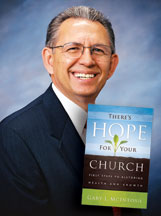By Ronald E. Keener
In writing There’s Hope for Your Church: First Steps to Restoring Health and Growth (Baker Books, 2012), author Gary L. McIntosh says “most pastors literally hate to confront others about anything.”
“Making difficult decisions means someone in the church won’t like you, which is very hard for many pastors to take. If a pastor is going to be a turnaround leader, he must be willing to pay the price of not being liked by some in the church,” he says.
 McIntosh is a veteran consultant and president of Church Growth Network and teaches at Talbot School of Theology. Church Executive asked him about the chapter “Make Hard Decisions”:
McIntosh is a veteran consultant and president of Church Growth Network and teaches at Talbot School of Theology. Church Executive asked him about the chapter “Make Hard Decisions”:
One hard decision is to “cut the fat,” you write, to stop the hemorrhaging. Any first steps?
One of the best questions to ask in a turnaround situation is “Would we do this if we were starting a brand-new church?” Particularly for small churches, I recommend going back to the beginning and looking at the church as a new church plant. If you were starting today, what would you do? What would you not do? Then cut the fat, the things you wouldn’t do today.
The inclination of most pastors is to stay out of the finances, but you say, “Control the cash.”
Someone must keep a close eye on the cash; that is, the income, payables, etc. The pastor must know what is going on financially. He or she should definitely keep “close watch” on the finances, and by that I mean every Monday morning a complete review of the entire financial situation.
What should a pastor in these circumstances do before even taking the job to ensure he isn’t fired after the first month?
Before accepting a call or appointment to a turnaround church, it is wise for a pastor to be open and upfront with what must be done to turn the church around. This means not just asking, “Do you want your church to grow?” A question like that is way too general. Instead a pastor should be as specific as possible. For instance, something like, “We will have to close the school by the end of the year.” Then get it in writing that the church will do it, or have them do it before you accept the call or appointment.
I also suggest that the pastor get a signed agreement that he cannot be dismissed for X number of years, or something like that. Each pastor has to work within the denominational or associational guidelines of the church, but do what can be done to secure agreement before accepting the call.
What is a problem person that you say needs to be confronted in order to move the church forward?
There are always people who keep the church from making the tough or necessary decisions. These people must be confronted and removed from control if a church is to turn around. If a pastor knows who such people are before coming to the church, it might be possible to require them to step down before accepting the call or appointment.
I don’t mean to imply a problem person is always a bad person; sometimes they are very nice people, but just blocking the road forward. To allow them to keep control will mean the church never is able to turnaround in a new direction.
Some people will say you aren’t being very “Christian” when you show people the door?
My advice is to communicate a clear direction and tell people if you are with me, I encourage you to stay and help us turn this church around. I never suggest saying that people should leave, but the implication is if you aren’t with me why stay? However, if a person is extremely obstinate, vocal or controlling, they may need to be confronted and asked to leave.


